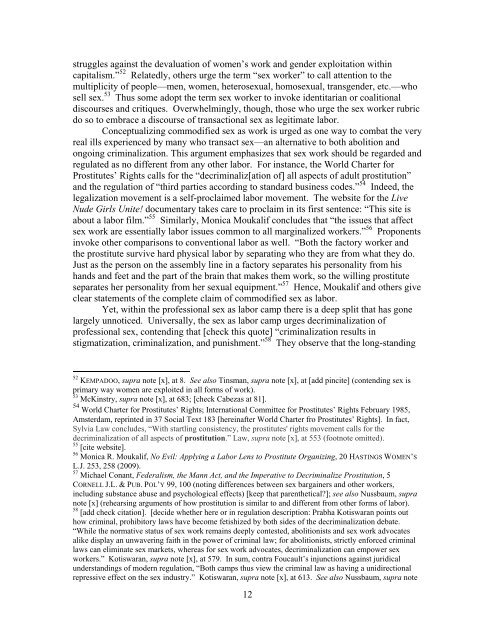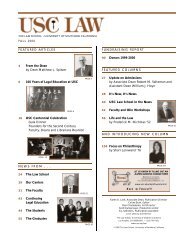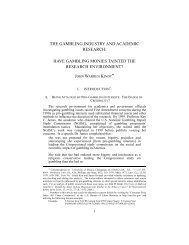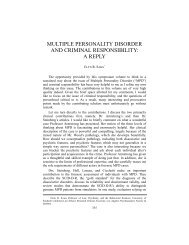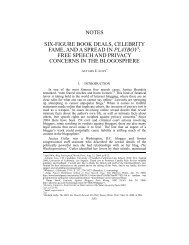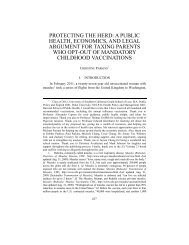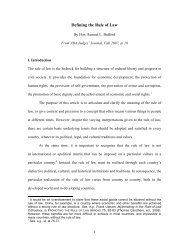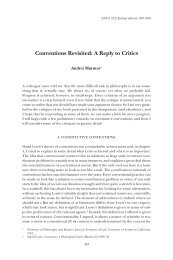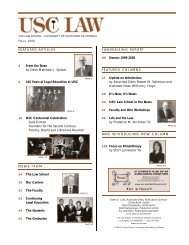1 Regulating Sex Work Adrienne D. Davis VERY ROUGH DRAFT ...
1 Regulating Sex Work Adrienne D. Davis VERY ROUGH DRAFT ...
1 Regulating Sex Work Adrienne D. Davis VERY ROUGH DRAFT ...
You also want an ePaper? Increase the reach of your titles
YUMPU automatically turns print PDFs into web optimized ePapers that Google loves.
struggles against the devaluation of women’s work and gender exploitation within<br />
capitalism.” 52 Relatedly, others urge the term “sex worker” to call attention to the<br />
multiplicity of people—men, women, heterosexual, homosexual, transgender, etc.—who<br />
sell sex. 53 Thus some adopt the term sex worker to invoke identitarian or coalitional<br />
discourses and critiques. Overwhelmingly, though, those who urge the sex worker rubric<br />
do so to embrace a discourse of transactional sex as legitimate labor.<br />
Conceptualizing commodified sex as work is urged as one way to combat the very<br />
real ills experienced by many who transact sex—an alternative to both abolition and<br />
ongoing criminalization. This argument emphasizes that sex work should be regarded and<br />
regulated as no different from any other labor. For instance, the World Charter for<br />
Prostitutes’ Rights calls for the “decriminaliz[ation of] all aspects of adult prostitution”<br />
and the regulation of “third parties according to standard business codes.” 54 Indeed, the<br />
legalization movement is a self-proclaimed labor movement. The website for the Live<br />
Nude Girls Unite! documentary takes care to proclaim in its first sentence: “This site is<br />
about a labor film.” 55 Similarly, Monica Moukalif concludes that “the issues that affect<br />
sex work are essentially labor issues common to all marginalized workers.” 56 Proponents<br />
invoke other comparisons to conventional labor as well. “Both the factory worker and<br />
the prostitute survive hard physical labor by separating who they are from what they do.<br />
Just as the person on the assembly line in a factory separates his personality from his<br />
hands and feet and the part of the brain that makes them work, so the willing prostitute<br />
separates her personality from her sexual equipment.” 57 Hence, Moukalif and others give<br />
clear statements of the complete claim of commodified sex as labor.<br />
Yet, within the professional sex as labor camp there is a deep split that has gone<br />
largely unnoticed. Universally, the sex as labor camp urges decriminalization of<br />
professional sex, contending that [check this quote] “criminalization results in<br />
stigmatization, criminalization, and punishment.” 58 They observe that the long-standing<br />
52<br />
KEMPADOO, supra note [x], at 8. See also Tinsman, supra note [x], at [add pincite] (contending sex is<br />
primary way women are exploited in all forms of work).<br />
53<br />
McKinstry, supra note [x], at 683; [check Cabezas at 81].<br />
54<br />
World Charter for Prostitutes’ Rights; International Committee for Prostitutes’ Rights February 1985,<br />
Amsterdam, reprinted in 37 Social Text 183 [hereinafter World Charter fro Prostitutes’ Rights]. In fact,<br />
Sylvia Law concludes, “With startling consistency, the prostitutes' rights movement calls for the<br />
decriminalization of all aspects of prostitution.” Law, supra note [x], at 553 (footnote omitted).<br />
55<br />
[cite website].<br />
56<br />
Monica R. Moukalif, No Evil: Applying a Labor Lens to Prostitute Organizing, 20 HASTINGS WOMEN’S<br />
L.J. 253, 258 (2009).<br />
57<br />
Michael Conant, Federalism, the Mann Act, and the Imperative to Decriminalize Prostitution, 5<br />
CORNELL J.L. & PUB. POL’Y 99, 100 (noting differences between sex bargainers and other workers,<br />
including substance abuse and psychological effects) [keep that parenthetical?]; see also Nussbaum, supra<br />
note [x] (rehearsing arguments of how prostitution is similar to and different from other forms of labor).<br />
58<br />
[add check citation]. [decide whether here or in regulation description: Prabha Kotiswaran points out<br />
how criminal, prohibitory laws have become fetishized by both sides of the decriminalization debate.<br />
“While the normative status of sex work remains deeply contested, abolitionists and sex work advocates<br />
alike display an unwavering faith in the power of criminal law; for abolitionists, strictly enforced criminal<br />
laws can eliminate sex markets, whereas for sex work advocates, decriminalization can empower sex<br />
workers.” Kotiswaran, supra note [x], at 579. In sum, contra Foucault’s injunctions against juridical<br />
understandings of modern regulation, “Both camps thus view the criminal law as having a unidirectional<br />
repressive effect on the sex industry.” Kotiswaran, supra note [x], at 613. See also Nussbaum, supra note<br />
12


